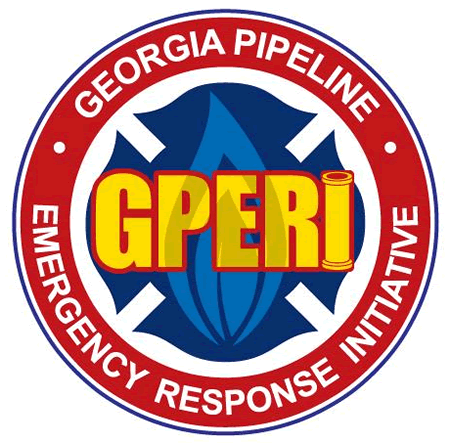The Georgia Pipeline Emergency Response Initiative (GPERI) was developed by a group of committed stakeholders including pipeline operators, governmental regulators and emergency responders. That group formalized the program in April 2014 and formed the Georgia Pipeline Emergency Responders Coalition (GPOERC) Board. The Board’s job is to oversee the program and develop funding streams to support the training portion (GPERI).
In Georgia, there are 92 different companies and municipalities that operate more than 85,000 miles of natural gas and hazardous liquid pipelines. These pipelines carry billions of gallons, barrels and cubic feet of flammable and combustible fuels operating 24/7/365. Many of these pipelines operate at high pressures. There are interstate and intrastate transmission lines ranging up to 42” in diameter as well as and local distribution (natural gas) pipeline systems. These pipelines are essential to the nation’s economy, our standard of living, our quality of life and national defense. They are “critical” infrastructure.
Underground pipelines represent the safest and most economical means to transport fuels in America. Significant pipeline incidents are rare but they can and do occur. When that happens there are potentially high consequences in terms of loss of life, serious injuries, property damage, environmental concerns and disruption of fuel supplies.
“Advance the ability of Georgia emergency responders to manage pipeline emergencies through improved training, cooperation and communication with pipeline operators.”
The GPERI has been designed with the mission statement in mind - to enhance emergency responders’ understanding of pipeline hazards; strengthen relationships among responders, pipeline operators and regulators; and improve the prevention of and management of pipeline emergencies through better communication.
The Georgia Association of Fire Chiefs (GAFC) and the Georgia Public Safety Training Center (GPSTC) have teamed up to initially develop and provide specialized and condensed pipeline emergency training to firefighters initially, and eventually to other emergency responders.
Why the GPERI program? Most firefighters in Georgia have likely been invited to or have attended brief “lunch and learn” training sessions over the years. These were usually sponsored by an individual pipeline operator. These were helpful but they were hit or miss and not truly providing adequate “need to know” information. In some cases the training was marginally attended. In some instances attendees could better tell you what they had for lunch and not what to do at a pipeline emergency.
The task of delivering this specialized training to Georgia’s approximately 28,000 firefighters requires some creative delivery techniques and platforms. The training is based on the nationally recognized “Pipeline Emergencies – 2nd Edition” 16-hour course and manual developed by the National Association of State Fire Marshal’s (NASFM). That 16-hour, two-day course will continue to be offered at GPSTC and in-the-field at your site. However, to make the training marketable to as many fire chiefs and firefighters as possible the 16-hour course was condensed into 4- and 8-hour courses for command staff, company officers / crews and 911 dispatchers.
“Pipeline Emergencies: Command Officer Strategies (PECOS)” - for command officers - 4-hour module
“Pipeline Emergencies: Company Officer Tactics (PECOT)” - for single-resource (company) officers and fire fighters – 8-hour module
“Pipeline Emergencies: Dispatcher Awareness Training (PEDAT)” - for 911 / PSAP call-takers and operators – 4-hour module
Future courses will expand pipeline emergency training to law enforcement, EMS, emergency managers, code enforcement, building inspectors, planners and other public officials.
All GPERI training is provided at NO cost to fire departments or firefighters. This is possible through the use of “seed money” funding from the Georgia Public Service Commission (GPSC) to the GAFC. The GPOERC Board has developed a funding model that will sustain and support the program through contributions from Georgia’s numerous pipeline operators.
GPERI training is provided through a joint effort of the GAFC and GPSTC. The full “Pipeline Emergencies” course (16-hours) is offered at the GPSTC Academy in Forsyth (GA) four times each year. This course is also deliverable to field sites as requested. The 16-hour course also serves as the basic “Instructor Trainer” course to enable individuals (Training Officers, etc.) to teach this course “in-house” (within their own fire departments), or, to serve as Field Instructors for the GAFC to teach courses around the state. If you are interested in becoming a GPERI qualified instructor contact the Program Manager.
Georgia firefighters may apply to take the PE course at GPSTC, however, all prospective students must be registered with GPSTC. Prospective students who want to enroll for a course, either at GPSTC or a field course, need to use the GPERI “on-line” registration process. All students for any GPERI PE courses need to be pre-enrolled for the course they will be attending. Training officers may pre-enroll multiple members of their department that are GPSTC registered. Questions or concerns about this should be directed to your department training officer or to the GPSTC Fire Academy at 478-993-5935.
Regional fire chief associations, training officer associations or individual fire departments need to send requests for GPERI field delivered courses to GPSTC by completing a formal Georgia Fire Academy Training Request (FC41 form). This form may be completed on-line at the GPSTC website.
Field training courses should be requested through GPSTC sixty (60) days in advance of the requested course date. Requested course dates will need to be approved by the GPERI Program manager who will confirm instructor availability. Once confirmed, GPSTC will issue authorization for the GPERI field-delivered course and post the course on their training schedule webpage.
Information on scheduled Pipeline Emergencies courses can be found at the GPSTC website. Students would also enroll for classes at this webpage.
The training publication texts used for the PE course and the PE short-courses are available on-line for “free” and may be downloaded at:
“Pipeline Emergencies, 2nd Edition”: http://www.pipelineemergencies.com/
“Pipeline Emergency Response Guidelines (2013)”: http://www.pipelineawareness.org
These documents are also downloadable as “free” PE apps for your smart phone, pad or tablet at:
Pipeline Emergencies - Android app:
http://www.amazon.com/National-Association-State-Fire-Marshals/dp/B007VHFIQ6
Pipeline Emergencies – Apple or iOS app:
https://itunes.apple.com/us/app/pipeline-emergencies/id435935478?mt=8
